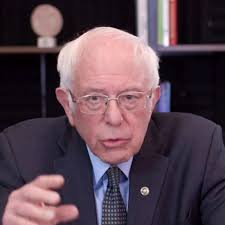It is likely that Russians will not be the only people suffering from sanctions. They would be felt in Europe. They would be felt here in the United States and around the world.
And, by the way, any hope of international cooperation to address the existential threat of global climate change and future pandemics would suffer a major setback.
Mr. President, we should be absolutely clear about who is most responsible for this looming crisis: Russian President Vladimir Putin. Having already seized parts of Ukraine in 2014, Putin now threatens to take over the entire country and destroy Ukrainian democracy. There should be no disagreement that this is unacceptable. In my view, we must unequivocally support the sovereignty of Ukraine and make clear that the international community will impose severe consequences on Putin and his fellow oligarchs if he does not change course.
With that said, M. President, I am extremely concerned when I hear the familiar drumbeats in Washington, the bellicose rhetoric that gets amplified before every war, demanding that we must "show strength," "get tough" and not engage in "appeasement." A simplistic refusal to recognize the complex roots of the tensions in the region undermines the ability of negotiators to reach a peaceful resolution.
I know it is not very popular in Washington to consider the perspectives of our adversaries but I think it is important in formulating good policy.
I think it is helpful to consider this: One of the precipitating factors of this crisis, at least from Russia's perspective, is the prospect of an enhanced security relationship between Ukraine and the United States and Western Europe, including what Russia sees as the threat of Ukraine joining the North Atlantic Treaty Alliance (NATO), a military alliance originally created in 1949 to confront the Soviet Union.
It is good to know some history. When Ukraine became independent after the Soviet Union collapsed in 1991, Russian leaders made clear their concerns about the prospect of former Soviet states becoming part of NATO and positioning hostile military forces along Russia's border. U.S. officials recognized these concerns as legitimate at the time.
One of those officials was William Perry, who served as Defense Secretary under President Bill Clinton. In a 2017 interview, Perry said and I quote, "In the last few years, most of the blame can be pointed at the actions that Putin has taken. But in the early years I have to say that the United States deserves much of the blame" "Our first action that really set us off in a bad direction was when NATO started to expand, bringing in eastern European nations, some of them bordering Russia."
Another U.S. official who acknowledged these concerns is former U.S. diplomat Bill Burns, who is now head of the CIA in the Biden administration. In his memoir, Burns quotes a memo he wrote while serving as counselor for political affairs at the US embassy in Moscow in 1995, and I quote: "Hostility to early NATO expansion is almost universally felt across the domestic political spectrum here."
Over ten years later, in 2008, Burns wrote in a memo to Secretary of State Condoleezza Rice, and I quote "Ukrainian entry into NATO is the brightest of all redlines for the Russian elite (not just Putin)" In more than two and a half years of conversations with key Russian players" I have yet to find anyone who views Ukraine in NATO as anything other than a direct challenge to Russian interests."
So again: these concerns were not just invented out of thin air by Putin.
Clearly, invasion by Russia is not an answer; neither is intransigence by NATO. It is important to recognize, for example, that Finland, one of the most developed and democratic countries in the world, borders Russia and has chosen not to be a member of NATO. Sweden and Austria are other examples of extremely prosperous and democratic countries that have made the same choice.
Mr. President, Vladimir Putin may be a liar and a demagogue, but it is hypocritical for the United States to insist that we do not accept the principle of "spheres of influence." For the last 200 years our country has operated under the Monroe Doctrine, embracing the premise that as the dominant power in the Western Hemisphere, the United States has the right to intervene against any country that might threaten our alleged interests.
Under this doctrine we have undermined and overthrown at least a dozen governments. In 1962 we came to the brink of nuclear war with the Soviet Union in response to the placement of Soviet missiles in Cuba, 90 miles from our shore, which the Kennedy Administration saw as an unacceptable threat to our national security.
And the Monroe Doctrine is not ancient history. As recently as 2018 Donald Trump's Secretary of State Rex Tillerson, called the Monroe Doctrine "as relevant today as it was the day it was written." In 2019, former Trump National Security Advisor John Bolton declared "the Monroe Doctrine is alive and well."
To put it simply, even if Russia was not ruled by a corrupt authoritarian leader like Vladimir Putin, Russia, like the United States, would still have an interest in the security policies of its neighbors. Does anyone really believe that the United States would not have something to say if, for example, Mexico was to form a military alliance with a U.S. adversary?
(Note: You can view every article as one long page if you sign up as an Advocate Member, or higher).





